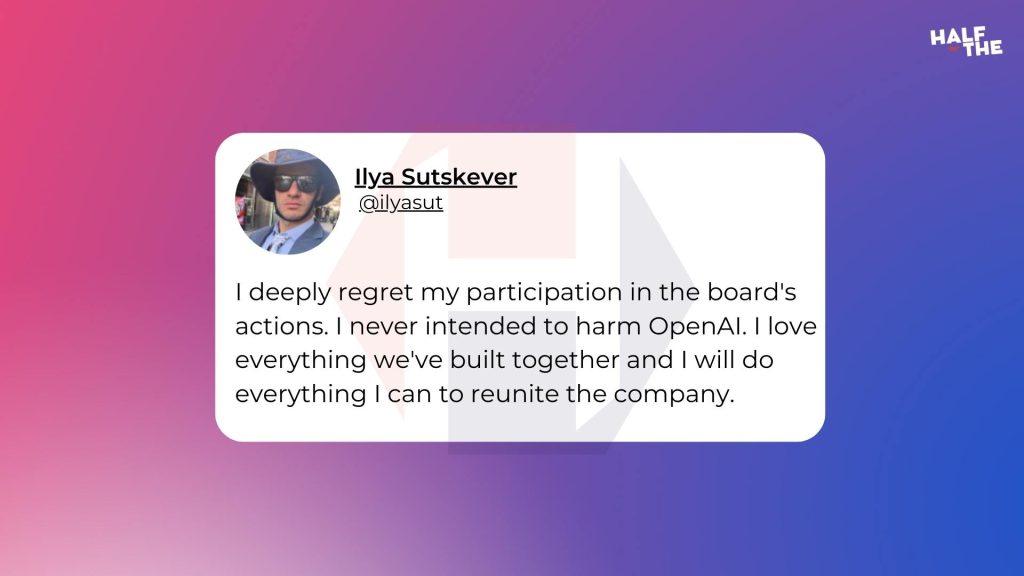A Tumultuous Turn in OpenAI’s Governance
The AI industry witnessed a significant upheaval at OpenAI, as Chief Scientist Ilya Sutskever publicly expressed regret over his involvement in the board’s controversial decision to oust CEO Sam Altman. This admission comes in the wake of a potent backlash from the company’s employees.
Employee Dissent and Ultimatum
- The Open Letter: Over 500 OpenAI employees signed an open letter, threatening to resign. They criticized the board for jeopardizing the company’s mission and undermining its leadership.
- Demands for Change: The letter demanded the reinstatement of Sam Altman and the resignation of the current board members, highlighting the employees’ critical role in the company’s success.
Sutskever’s Response: Regret and Reconciliation
- Public Admission: Sutskever stated, “I deeply regret my participation in the board’s actions. I never intended to harm OpenAI. I love everything we’ve built together and I will do everything I can to reunite the company.”
- Potential Motives: His response seems to be influenced by the escalating internal conflict and the threat of losing a significant portion of the workforce.

Impact and Implications
- A Shift in Dynamics: Sutskever’s statement represents a shift in the power dynamics within OpenAI, acknowledging the significant influence of employee sentiment.
- Future of Leadership: The unfolding events raise questions about the future leadership and governance structure at OpenAI.
Employee Contributions and Company’s Direction
- Critical Role of Staff: The employees’ letter emphasized their vital contributions to AI advancements and product development.
- Vision vs. Governance: The conflict highlights a growing tension between the company’s innovative vision and its current governance model.
A Pivotal Moment for OpenAI
The crisis at OpenAI, marked by Sutskever’s admission and the employee ultimatum, underscores the challenges of balancing innovative progress with effective leadership and governance in the fast-evolving AI industry. The resolution of this situation will be a defining moment for OpenAI and could set a precedent for corporate governance in the technology sector.
Who is Ilya Sutskever?
Ilya Sutskever, a prominent figure in the field of artificial intelligence, is a Russian-born Israeli-Canadian computer scientist renowned for his contributions to machine learning. Born in 1985 or 1986 in Nizhny Novgorod, Russia (formerly Gorky in the Soviet Union), Sutskever moved to Israel with his family at the age of five, spending his formative years in Jerusalem.
Education and Early Career:
- Open University of Israel: Sutskever began his academic journey at the Open University of Israel between 2000 and 2002.
- University of Toronto: He then moved to Canada with his family, where he continued his education at the University of Toronto. There, he earned a Bachelor of Science in Mathematics in 2005, a Master of Science in Computer Science in 2007, and a Ph.D. in Computer Science in 2013. His doctoral supervisor was the renowned Geoffrey Hinton.
Significant Contributions:
- AlexNet: In 2012, while at the University of Toronto, Sutskever, alongside Alex Krizhevsky and Geoffrey Hinton, developed AlexNet, a groundbreaking convolutional neural network. To support AlexNet’s computational needs, Sutskever notably acquired several GTX 580 GPUs.
- AlphaGo Paper: He is also credited as one of the co-authors of the influential AlphaGo paper.
Professional Career:
- Stanford University: After his time at the University of Toronto, Sutskever briefly worked as a postdoc with Andrew Ng at Stanford University in late 2012.
- DNNResearch: He returned to Toronto to join Geoffrey Hinton’s DNNResearch, a spinoff of Hinton’s research group.
- Google Brain: In 2013, following Google’s acquisition of DNNResearch, Sutskever joined Google Brain as a research scientist. There, he contributed to the development of the sequence-to-sequence learning algorithm with Oriol Vinyals and Quoc Viet Le and worked on TensorFlow.
- OpenAI: At the end of 2015, Sutskever left Google to co-found OpenAI, where he serves as a board member and Chief Scientist.
Recent Developments:
- Superalignment Project: In 2023, Sutskever announced his co-leadership of OpenAI’s “Superalignment” project, aiming to align superintelligences within four years.
- Board Meeting and Aftermath: As one of the six board members controlling OpenAI, Sutskever played a pivotal role in the November 2023 board meeting that led to the firing of Sam Altman and the resignation of Greg Brockman. This action, speculated to be partly due to disagreements over AI safety commitments, sparked significant internal turmoil, including the resignation of three senior researchers.
Regret and Reconciliation:
- Initial Statement: Following the board meeting, Sutskever defended the decision, stating it was “the board doing its duty.”
- Subsequent Regret: However, he later expressed regret over his participation in Altman’s ouster, indicating a complex interplay of leadership, governance, and moral responsibility at the forefront of AI development.
Sutskever’s journey from a student in Israel to a key player in the global AI community reflects a deep commitment to advancing the frontiers of machine learning and artificial intelligence. His contributions, both technical and leadership-wise, have significantly shaped the landscape of modern AI.



